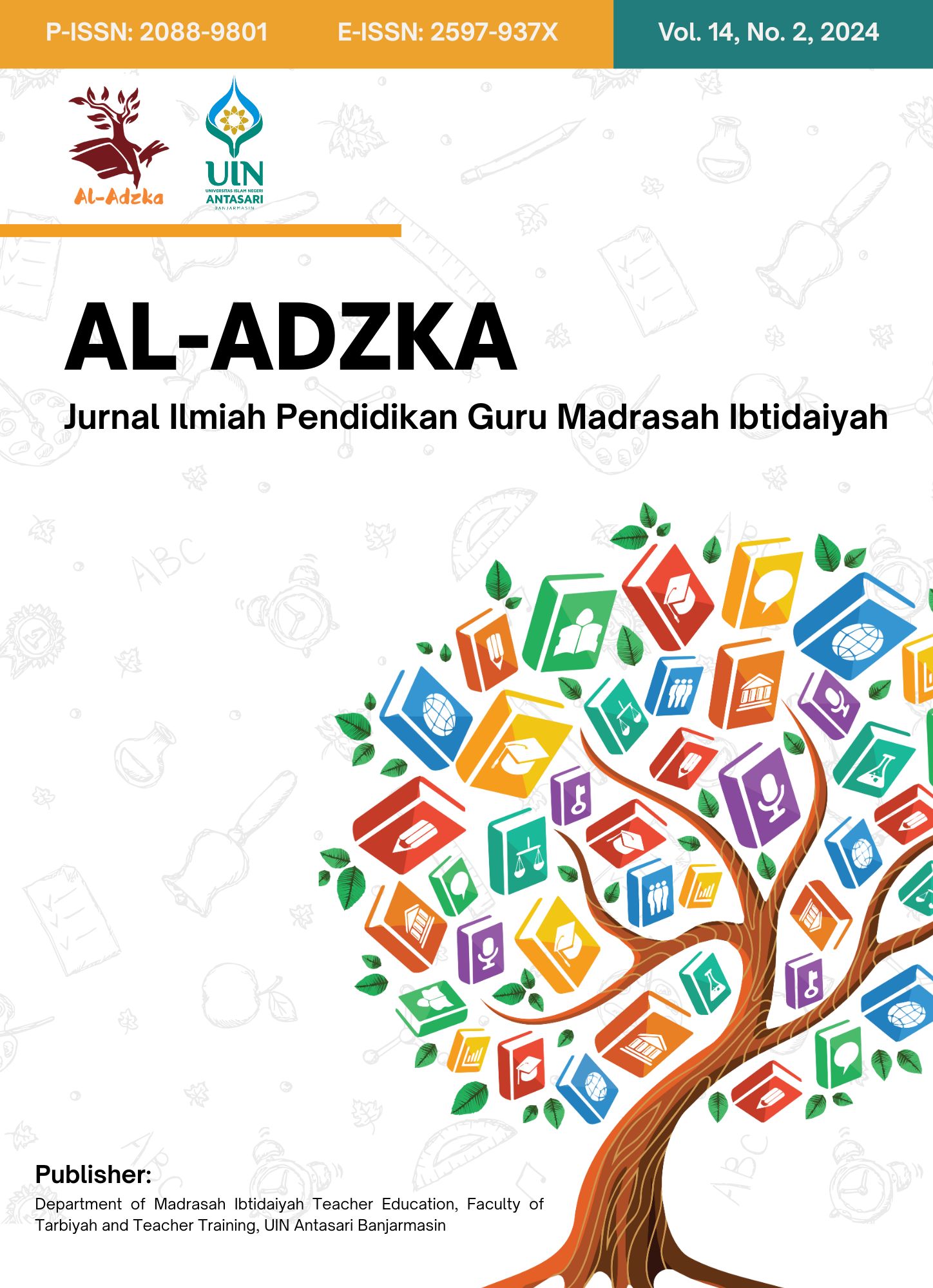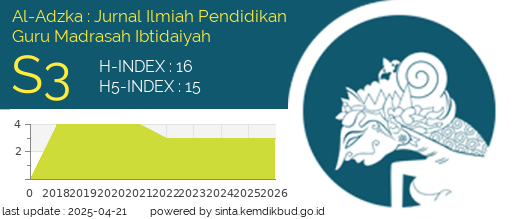Child-Friendly Schools in Primary Education Institutions
DOI:
https://doi.org/10.18592/aladzkapgmi.v14i2.13738Keywords:
Child-Friendly School; Written Policy, Child-Friendly Learning Teacher Training; School Facilities, Student ParticipationAbstract
This study aims to identify the implementation of five indicators of Child-Friendly Schools at SDN SN Karang Mekar 1, Banjarmasin City. This study's research type is qualitative descriptive research, utilizingmethods such as interviews, observations, and document analysis. This study found that the written policy indicators have been well implemented by declaring a commitment to non-violence and creating a safe student environment. Child-friendly learning processes are implemented with a non-violent and fun approach, supporting an inclusive learning atmosphere. Training for teachers on children's rights has created a school atmosphere that supports students' holistic development. Although school facilities are adequate, improved accessibility for children with special needs is still needed. In addition, students' participation in extracurricular activities is good, but their decision-making involvement still needs improvement. The implications of the findings suggest the need for more robust policies, continuous training, and improved infrastructure and student participation to realize entirely child-friendly schools.References
Abidin, Z., Imaduddin, I., & Hamzah, A. F. (2022). Manajemen Pendidikan Ramah Anak dalam Lembaga Pendidikan Islam. EDUKASIA: Jurnal Pendidikan Dan Pembelajaran, 3(3), 1055–1062. https://doi.org/10.62775/edukasia.v3i3.271
Andrean, S., & Muqowim. (2020). Upaya Guru dalam Membiasakan Karakter melalui Pembelajaran Aqidah Akhlak di MI Ma’arif. Al Adzka Jurnal Pendidikan Guru Madrasah Ibtidaiyah, 10(1), 43–52. https://doi.org/10.18592/aladzkapgmi.v10i1.3634
Artadianti, K., & Subowo, A. (2017). Implementasi Sekolah Ramah Anak (SRA) pada Sekolah Percontohan di SD Pekunden 01 Kota Semarang Sebagai Upaya Untuk Mendukung Program Kota Layak Anak. Journal Of Public Policy And Management Review, 6(2). https://doi.org/10.14710/jppmr.v6i3.16683
Darma, S., Elfrianto, E., Sianipar, L. F., Asbi, M. F., & Natalia, P. (2023). Implementation of Child Friendly School Governance in Junior High Schools Country 3 Labuhan Deli Satu Atap. Journal Of Education And Teaching Learning (JETL), 5(1), 91–100. https://doi.org/10.51178/jetl.v5i1.1214
Daryono, D., Hardhienata, S., & Retno Wati, R. (2023). Effectiveness of Implementation of the Child-Friendly School Program. International Journal of Social Health, 2(5), 272–283. https://doi.org/10.58860/ijsh.v2i5.50
Effendi, M. S. & Supadi. (2023). Child-Friendly School Environment Management. JPI (Jurnal Pendidikan Indonesia), 12(4), 732–740. https://doi.org/10.23887/jpiundiksha.v12i4.68681
Harun, R. R., Septyanun, N., Erwin, Y., Supryadi, A., Yamin, B., Yuliani, T., Fahrurrozi, F., Aminwara, R., Mantika, A. F., & Ariani, Z. (2024). Building Legal Awareness Of Children In Asy-Syifa Orphanage’ Against Bullying In The School And Community Environment. Al-Amal: Jurnal Pengabdian Masyarakat, 2(1), 36–42. https://doi.org/10.59896/amal.v2i1.94
Hasanah, U., Fauzia, W., Kaswati, A., Rahayu, S. H., & Zilfa, R. (2024). Kelengkapan Sarana Prasarana Pada Kelompok Bermain Menuju Lingkungan Ramah Anak. Asas Wa Tandhim: Jurnal Hukum, Pendidikan Dan Sosial Keagamaan, 3(1), 57–70. https://doi.org/10.47200/awtjhpsa.v3i1.2234
Huriyah. (2019). Menumbuhkan Sikap Sosial melalui Pembelajaran IPS pada Peserta Didik SD Home Schooling Primagama Banjarmasin. Al Adzka Jurnal Pendidikan Guru Madrasah Ibtidaiyah, 9(2), 75–84. https://doi.org/10.18592/aladzkapgmi.v9i2.3273
Iskandar, D., Yuni Hendrowati, T., & Siswoyo, S. (2024). Efektivitas Program Sekolah Ramah Anak Dalam Mengembangkan Sekolah Berkarakter. Manajemen Pendidikan, 61–72. https://doi.org/10.23917/jmp.v19i1.4852
Jayanti, R. A. D. & Rahmat. (2023). Pendidikan Akhlak melalui Program Sekolah Ramah Anak di MIN 2 Mojokerto. Arus Jurnal Psikologi Dan Pendidikan, 2(3), 307–319. https://doi.org/10.57250/ajpp.v2i3.255
Juwitasari, I. (2021). Penerapan Metode Pemodelan untuk Meningkatkan Kemampuan Mengungkapkan Kalimat Saran, Masukan & Penyelesaian Masalah. Jurnal Educatio, 7(4), 1470–1475. https://doi.org/10.31949/educatio.v7i4.1520
Kattam, A. J., Barasa, P. L., Kapkiai, M., & Bitok, E. C. (2024). Teacher’s Perception of Child-friendly School Environment in Public ECDE Centres in Uasin-Gishu County. Research Journal of Education, Teaching and Curriculum Studies, 2(1), 8–15. https://doi.org/10.58721/rjetcs.v2i1.574
Liestyasari, S., I., Karsidi, R., . A., & Rahman, A. (2023). Children Right’s Analysis of the Implementation of Child-Friendly Schools in Surakarta. KnE Social Sciences. https://doi.org/10.18502/kss.v8i2.12756
Majdi, M. (2019). Program Sekolah Adiwiyata dalam Pengembangan Sosio-Emosional Anak Usia Dasar di SDN Ngupasan Yogyakarta. Al Adzka Jurnal Pendidikan Guru Madrasah Ibtidaiyah, 9(2), 85–98. https://doi.org/10.18592/aladzkapgmi.v9i2.3246
Mansir, F. (2022). Pendidikan dan Perlindungan Anak di Sekolah: Upaya Perlindungan dan Pencegahan Serta Penanganan di Indonesia. Elementary: Jurnal Ilmiah Pendidikan Dasar, 8(1), 15–30. https://doi.org/10.32332/elementary.v8i1.3370
Miles, M. B., Huberman, A. M., & Saldaña, J. (2014). Qualitative data analysis: A methods sourcebook (Edition 3). Sage.
Ningrum, D. P., Wahyudin, N. A., Fauziyah, R. I., Safitri, V. Y., & Zulfahmi, M. N. (2023). Sekolah Ramah Anak Sebagai Perwujudan Harapan Bangsa. Jurnal Insan Pendidikan Dan Sosial Humaniora, 1(3), 171–178. https://doi.org/10.59581/jipsoshum-widyakarya.v1i3.830
Njelesani, J., Lai, J., Gigante, C. M., & Trelles, J. (2022). Will You Protect Me or Make the Situation Worse?: Teachers’ Responses to School Violence Against Students with Disabilities. Journal of Interpersonal Violence, 37(23–24), 723–748. https:// doi.org/10.1177/08862605211062996
Olsen, R. K. (2023). Key factors for child participation – an empowerment model for active inclusion in participatory processes. Frontiers in Psychology, 14, 1247483. https://doi.org/10.3389/fpsyg.2023.1247483
Panda, A., Sa, Mr. B. S., & Das, Ms. S. (2024). Child-Friendly Approaches in Context to Neighbourhood Streets—A Case of Ward No 17, Rourkela. International Journal for Research in Applied Science and Engineering Technology, 12(5), 5500–5505. https://doi.org/10.22214/ijraset.2024.62876
Patte, K. A., Cole, A., Qian, W., Magier, M., Vine, M., & Leatherdale, S. T. (2020). Are closed campus policies associated with youth eating behaviours? https://doi.org/10.21203/rs.3.rs-36470/v1
Pudyaningtyas, A. R., Rahmawati, A., Hafidah, R., Palupi, W., Dewi, N. K., Sholeha, V., & Syamsuddin, M. M. (2023). Keterlibatan Orang Tua dalam Mewujudkan Pendidikan Anak Usia Dini Ramah Anak di Gugus Budi Mulia II Sukoharjo. DEDIKASI: Community Service Reports, 5(1). https://doi.org/10.20961/dedikasi.v5i1.67052
Peraturan Menteri Pemberdayaan Perempuan dan Perlindungan Anak Nomor 12 Tahun 2022 tentang Penyelenggaraan Kabupaten/Kota Layak Anak.
Peraturan Walikota (Perwali) Kota Banjarmasin Nomor 44 Tahun 2013 tentang Kebijakan Pengembangan Kota Layak Anak
Rahmad. (2021). The Profile of State Islamic Primary School Teacher Education in Palangka Raya. Al Adzka Jurnal Pendidikan Guru Madrasah Ibtidaiyah, 11(1), 49–57. https://doi.org/10.18592/aladzkapgmi.v11i1.4438
Rahmawati. (2020). Analisis Adversity Quotient Mahasiswa PGMI dalam Mengatasi Masalah. Al Adzka Jurnal Pendidikan Guru Madrasah Ibtidaiyah, 9(2), 99–106. https://doi.org/10.18592/aladzkapgmi.v9i2.3122
Rangkuti, S., & Maksum, I. R. (2019). Implementasi Kebijakan Sekolah Ramah Anak Dalam Mewujudkan Kota Layak Anak di Kota Depok. Publik Jurnal Ilmu Administrasi, 8(1), 38–52. http://dx.doi.org/10.31314/pjia.8.1.38-52.2019
Rimang, S. S., Agustang, A., & Tahir, H. (2023). The Child-Friendly School Literacy Movement at The Indonesian Daan Haag School, The Netherlands. International Journal of Innovative Research in Multidisciplinary Education, 02(09). https://doi.org/10.58806/ijirme.2023.v2i9n01
Riyanto, J., Miyono, N., & Abdullah, G. (2022). Implementasi Kebijakan Sekolah Ramah Anak di SMA Negeri 1 Pemalang Kabupaten Pemalang. JCOSE (Jurnal Bimbingan Dan Konseling), 5(1), 20–28. https://doi.org/10.24905/jcose.v5i1.120
Rofiah, N. H., Hayati, E. N., & Muarifah, A. (2019). Model Sekolah Ramah Anak Yang Secara Arif Secara Lokal. Universitas Ahmad Dahlan.
Saputri, D. W. R., & Hasibuan, R. (2022). Child-friendly school in improving children’s confident character. Aṭfālunā Journal of Islamic Early Childhood Education, 5(2), 38–59. https://doi.org/10.32505/atfaluna.v5i2.4762
Sari, M. W., Adhani, D. N., & Karim, M. B. (2012). Peran Guru Dalam Penerapan Sekolah Ramah Anak di TK YKK 1 Bangkalan. Jurnal Pendidikan Dan Pembelajaran Anak Usia Dini, 8(1), 8–14. https://doi.org/10.21107/pgpaudtrunojoyo.v8i1.9088
Satriyawan, A. N., & Ichsan, A. S. (2020). Modifikasi Perilaku Anak: Implementasi Teknik Pengelolaan Diri dan Keterampilan Sosial di Ngawi Jawa Timur. Al Adzka Jurnal Pendidikan Guru Madrasah Ibtidaiyah, 10(1), 21–32. https://doi.org/10.18592/aladzkapgmi.v10i1.3645
Schätzer, M., Bhardwaj, J., Sommer, J., Miskovic, R., König, J., & Hoppichler, F. (2021). Catering situation at Austrian schools. European Journal of Public Health, 31(Supplement_3), ckab165.525. https://doi.org/10.1093/eurpub/ckab165.525
Sholeh, M. (2021). Transformational Leadership: Principal Intellectual Stimulation In Improving Teacher Competences. Al-Ta Lim Journal, 28(2), 167–179. https://doi.org/10.15548/jt.v28i2.708
Sholeh, M., Jannah, R., Mahmudah, M., & Khairunnisa, K. (2021). Pengembangan Model Pembelajaran Efektif Dan Bermakna Di MI Perwanida Blitar. Muallimuna : Jurnal Madrasah Ibtidaiyah, 6(2), 16. https://doi.org/10.31602/muallimuna.v6i2.4301
Suharsiwi, S., Arifin, R. S., Setiyanti, A., & Arvan, M. (2023). Implementing Child-Friendly Schools Program at Muhammadiyah Elementary School in South Tangerang. Indonesian Journal of Islamic Education Studies (IJIES), 6(1), 109–122. https://doi.org/10.33367/ijies.v6i1.3619
Sumarni, T., Hambali, & Haryono. (2019). Analysis The Implementation Of Children Friendly School Program (SRA) At SMP Negeri 5 Pekanbaru. JOM FKIP, 6(2), 1–10. https://jom.unri.ac.id/index.php/JOMFKIP/article/view/25872
Sunardianta, R., Diat Prasojo, L., Yuliarto, H., & Firmansyah, F. (2024). Child-friendly school-based learning management model for health and physical education. Jurnal Cakrawala Pendidikan, 43(2). https://doi.org/10.21831/cp.v43i2.64652
Sutami, B., Setyawan, D., & Fithriana, N. (2020). Implementasi Program Sekolah Ramah Anak Dalam Mewujudkan Kota Layak Anak di Kota Batu. Reformasi, 10(1), 19–26. https://doi.org/10.33366/rfr.v10i1.1695
Torres, C. E., D’Alessio, S. J., & Stolzenberg, L. (2020). The Effect of Social, Verbal, Physical, and Cyberbullying Victimization on Academic Performance. Journal of Victim & Offenders, 15(1), 1–21. https://doi.org/10.1080/15564886.2019.1 681571
Undang-Undang Nomor 20 Tahun 2003 Tentang Sistem Pendidikan Nasional.
Undang-Undang Nomor 23 Tahun 2002 tentang Perlindungan Anak
Umar, S., Senang, S., & Sunardi, S. (2024). Peningkatan Mutu Pembelajaran Melalui Pengembangan Sarana dan Prasarana. Irsyaduna: Jurnal Studi Kemahasiswaaan, 4(1), 16–28. https://doi.org/10.54437/irsyaduna.v4i1.1552
Yosada, K. R., & Kurniati, A. (2019). Menciptakan Sekolah Ramah Anak. Jurnal Pendidikan Dasar Perkhasa, 5(2), 145–154. https://doi.org/10.31932/jpdp.v5i2.480
Yuyun, Zarkasih, & Sapriati, A. (2022). Implementasi Program Sekolah Ramah Anak Di Sekolah Dasar Negeri Kecamatan Marpoyan Damai Kota Pekanbaru. Jurnal Bidang Pendidikan Dasar, 6(1), 10–23. https://doi.org/10.21067/jbpd.v6i1.6122
Downloads
Published
How to Cite
Issue
Section
License
Copyright (c) 2024 Rahmad Rahmad, Nur Inayah Syar, Syahmidi Syahmidi, Mualimin Mualimin

This work is licensed under a Creative Commons Attribution 4.0 International License.
Authors who publish with this journal agree to the following terms:
- Authors retain copyright and grant the journal right of first publication with the work simultaneously licensed under a Creative Commons Attribution 4.0 International that allows others to share the work with an acknowledgement of the work's authorship and initial publication in this journal.
- Authors are able to enter into separate, additional contractual arrangements for the non-exclusive distribution of the journal's published version of the work (e.g., post it to an institutional repository or publish it in a book), with an acknowledgement of its initial publication in this journal.
- Authors are permitted and encouraged to post their work online (e.g., in institutional repositories or on their website) prior to and during the submission process, as it can lead to productive exchanges, as well as earlier and greater citation of published work.












